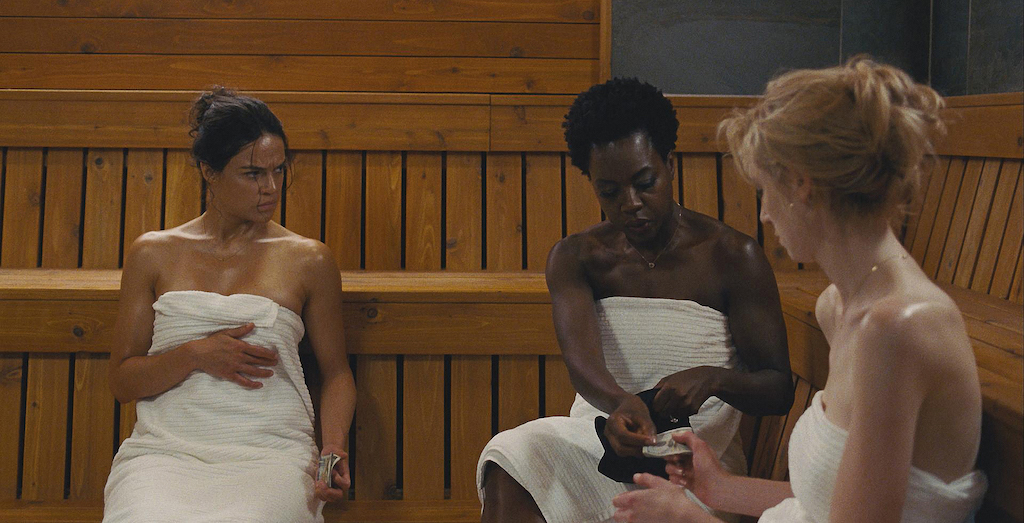
There is something gloriously liberating about Steve McQueen’s Widows. It seems divorced from the political sensitivities of the day, in all the best ways. The female characters at the center of the film are both smart and dumb, strong and weak, supportive and self-serving—often at the same time. The politicians and gang leaders are all equally corrupt. The violence is shocking, cold-blooded, and defiantly funny.
None of this would work, or at least might seem exploitative, in the hands of a lesser director, but McQueen is a master: He grabs hold of you from the first frame and never lets go.
The opening sequence is a jolt of pure cinema. There, we meet most of the main players in a shocking parallel sequence. First, we see various forms of domesticity—Veronica (Viola Davis) lounging on Egyptian cotton sheets in post-coital bliss with her husband, Harry (Liam Neeson); Linda (Michelle Rodriguez) exchanging exasperated, if playful, banter with her thieving husband; Alice (Elizabeth Debicki) sitting at the kitchen table with her abusive husband and giving him a forgiving kiss; Amanda (Carrie Coon) tending to an infant baby as her husband rushes out the door. All of these scenes are intercut with a heist, being led by Harry, gone horribly wrong—police chases, gunfire, and, finally, a deadly explosion. We reflect on the film’s title and immediately know what it all means.
From there, we meet some of the other main players in this twisty saga: Irish politician Jack Mulligan (Colin Farrell) who hails from a long line of Chicago pols who have nominally served their community while lavishly lining their pockets. He somewhat petulantly doesn’t want to carry on the family tradition—he fancies himself as more refined than his retiring alderman father Tom (Robert Duvall)—but both his grasping wife and the bullying Tom won’t have it. Jack is running against a gang leader who wants to go “straight,” Jamal Manning (Brian Tyree Henry). At Jamal’s side is his terrifying brother, Jatemme (Daniel Kaluuya), who could kill you with an icy stare (and, uh, lots of other things).
Shortly after Harry’s funeral, Jamal shows up at Veronica’s chic condo, demanding the $2 million dollars Harry stole from him and lost in the blast. (He also picks up and strokes Veronica’s West Highland white terrier in a very threatening way—McQueen is not above putting the adorable pooch in peril.) Veronica doesn’t have that kind of cash, but she does have something Harry left behind for her: Very specific plans for his next heist, which should yield $5 million. Veronica could sell the plans to Jamal, but she has another idea: She’s going to assemble the “widows” into a team and they’re going to pull off the heist on their own.
Here’s the thing about Veronica: This is not some moment of “you go, girl!” solidarity. The proposal she makes to Alice and Linda (Amanda is a no-show) is both an opportunity and a threat. If they don’t agree to help her, she could share their identities with Jamal. But neither really hesitates. For Linda, it’s a chance to prove to herself—and her children—that “I didn’t just sit there and take it, I did something,” as she puts it. For the gorgeous Alice it’s a chance to break the cycle of powerful men who have exploited and abused her. Later, they are joined by the scrappy and endlessly resourceful Belle (Cynthia Erivo), a hard worker who will do anything to provide for her daughter.
All the actresses here do amazing work, but Davis and Debicki are standouts. Davis doesn’t try to be likeable. Yes, she shows that Veronica is afraid, she’s vulnerable. But she’s also tough, impatient, and imperious. (And damn does she look good swathed in a series of black and white cashmere blazers.) As for Debicki, it’s wonderful to watch her Alice come into her own—the proud gleam in her eye after she manages to charm a woman into buying her glocks at a gun show is adorable. She’s learning that she’s self-sufficient and capable and worthy—and she likes it.
On top of being one hell of an action thriller, Widows is the kind of feminist film I’ve been craving. All the women in the film are standing up to an oppressive patriarchy, by whatever means necessary. I don’t need my female characters be pure saints or sinners. It’s best when they’re a little bit of both.
